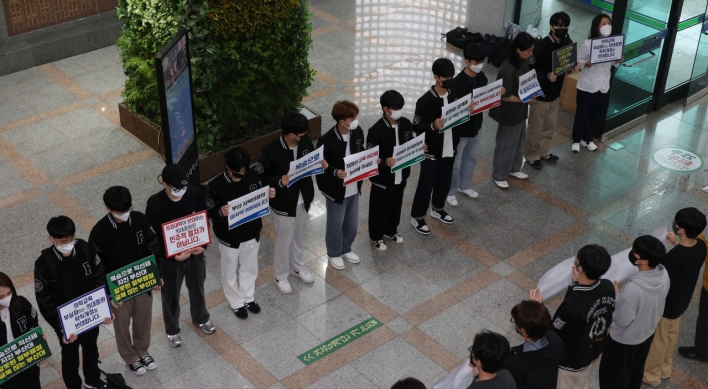Uncertainties shroud N.K. economy under Kim Jong-un
By Korea HeraldPublished : Dec. 22, 2011 - 16:02
China’s role deemed critical in Pyongyang’s next move on economy
When it comes to North Korea’s future following the death of its leader Kim Jong-il, peaceful denuclearization is often cited as key.
Equally important, however, is the outlook for the isolated state’s battered economy, especially as any change would have a great impact on neighboring countries.
The problem is that analysts and experts in Korea and elsewhere seem baffled by the sheer lack of information about the chosen successor, Kim Jong-un. Even his true age, speculated in the late 20s, remains guesswork.
Some foreign analysts in Washington suggested this week Jong-un’s background ― he briefly attended a school in Switzerland ― might lead to a relatively reform-oriented economic policy that entails at least a partial opening of the market. This hopeful scenario, however, is largely a matter of speculation, though Korean analysts agreed it is one possibility ― a positive one.
“As far as the North Korean economy is concerned, Kim Jong-un might adopt a progressive line,” said an analyst at the economic research center of IBK in Seoul. “We cannot downplay the fact that Kim studied abroad, and he must have been exposed to economic issues when’s he outside of North Korea.”
The junior Kim, while being groomed as a third-generation leader under Kim Jong-il, was reportedly engaged in projects that involve foreign parters such as the linkage of Russian gas pipes to South Korea, special economic zones and the development of industrial belts designed for cross-border trades.
“Kim Jong-il might have drawn up a market-opening plan based on close partnerships with its key ally China, so Kim Jong-un is likely to push ahead with his father’s economic policy line for a while,” said Hong Ik-pyo, researcher at the Korea Institute for International Economic Policy.
China’s role is crucial. Less than 20 percent of North Korea’s economy relies on external trade and China’s portion accounts for 88 percent of the total trade volume as of 2010, according to the data of KOTRA.
China, which has already beginning to play its own regional power game right from the word of Kim Jong-il’s death, is keen to help North Korea stabilize through economic cooperation.
But negative views about such scenario in favor of reforms abound. Political uncertainties, among others, are surging as Kim Jong-un has to solidify his position as the next leader of the reclusive regime. Any internal political turmoil could kill any market-friendly measures right away.
Hanwha Securities said that unlike Kim Jong-il’s successor-grooming period, Kim Jong-un’s prepping period at the top ranks of North Korea is fairly brief, which could bring more unpredictable developments in connection with the country’s economy.
Another factor to consider is the problems with the market elements introduced in 2002. Pyongyang’s basic policy is a centrally controlled economy, but the new policy in 2002 scrapped its decades-old food rating system and boosted prices of goods. But as the move sparked serious inflation and generated side effects, North Korea put a tight control on market systems in late 2005. The currency reform in 2009 also backfired viciously, worsening food shortages.
In a research report titled “Political Economy of Marketization and Monetization in North Korea,” Rudiger Frank, of University of Vienna, Pyongyang’s market reforms might be slowed or even reversed, due to unfavorable international conditions, lack of understanding of economic polices and negative effects on its isolated society.
By Yang Sung-jin (insight@heraldcorp.com)
When it comes to North Korea’s future following the death of its leader Kim Jong-il, peaceful denuclearization is often cited as key.
Equally important, however, is the outlook for the isolated state’s battered economy, especially as any change would have a great impact on neighboring countries.
The problem is that analysts and experts in Korea and elsewhere seem baffled by the sheer lack of information about the chosen successor, Kim Jong-un. Even his true age, speculated in the late 20s, remains guesswork.
Some foreign analysts in Washington suggested this week Jong-un’s background ― he briefly attended a school in Switzerland ― might lead to a relatively reform-oriented economic policy that entails at least a partial opening of the market. This hopeful scenario, however, is largely a matter of speculation, though Korean analysts agreed it is one possibility ― a positive one.
“As far as the North Korean economy is concerned, Kim Jong-un might adopt a progressive line,” said an analyst at the economic research center of IBK in Seoul. “We cannot downplay the fact that Kim studied abroad, and he must have been exposed to economic issues when’s he outside of North Korea.”
The junior Kim, while being groomed as a third-generation leader under Kim Jong-il, was reportedly engaged in projects that involve foreign parters such as the linkage of Russian gas pipes to South Korea, special economic zones and the development of industrial belts designed for cross-border trades.
“Kim Jong-il might have drawn up a market-opening plan based on close partnerships with its key ally China, so Kim Jong-un is likely to push ahead with his father’s economic policy line for a while,” said Hong Ik-pyo, researcher at the Korea Institute for International Economic Policy.
China’s role is crucial. Less than 20 percent of North Korea’s economy relies on external trade and China’s portion accounts for 88 percent of the total trade volume as of 2010, according to the data of KOTRA.
China, which has already beginning to play its own regional power game right from the word of Kim Jong-il’s death, is keen to help North Korea stabilize through economic cooperation.
But negative views about such scenario in favor of reforms abound. Political uncertainties, among others, are surging as Kim Jong-un has to solidify his position as the next leader of the reclusive regime. Any internal political turmoil could kill any market-friendly measures right away.
Hanwha Securities said that unlike Kim Jong-il’s successor-grooming period, Kim Jong-un’s prepping period at the top ranks of North Korea is fairly brief, which could bring more unpredictable developments in connection with the country’s economy.
Another factor to consider is the problems with the market elements introduced in 2002. Pyongyang’s basic policy is a centrally controlled economy, but the new policy in 2002 scrapped its decades-old food rating system and boosted prices of goods. But as the move sparked serious inflation and generated side effects, North Korea put a tight control on market systems in late 2005. The currency reform in 2009 also backfired viciously, worsening food shortages.
In a research report titled “Political Economy of Marketization and Monetization in North Korea,” Rudiger Frank, of University of Vienna, Pyongyang’s market reforms might be slowed or even reversed, due to unfavorable international conditions, lack of understanding of economic polices and negative effects on its isolated society.
By Yang Sung-jin (insight@heraldcorp.com)
-
Articles by Korea Herald







![[KH Explains] Can tech firms' AI alliances take on Nvidia?](http://res.heraldm.com/phpwas/restmb_idxmake.php?idx=644&simg=/content/image/2024/05/07/20240507050619_0.jpg&u=)


![[Grace Kao, Meera Choi] Has money displaced romance on dates?](http://res.heraldm.com/phpwas/restmb_idxmake.php?idx=644&simg=/content/image/2024/05/06/20240506050233_0.jpg&u=)








![[K-pop’s dilemma] Time, profit pressures work against originality](http://res.heraldm.com/phpwas/restmb_idxmake.php?idx=642&simg=/content/image/2024/05/08/20240508050690_0.jpg&u=)